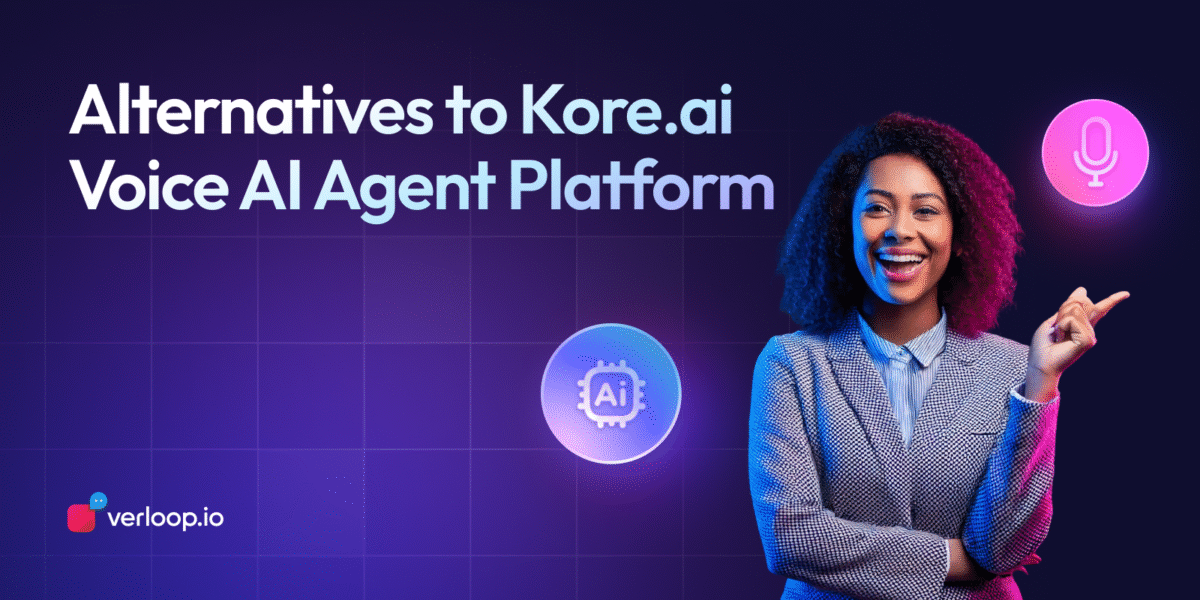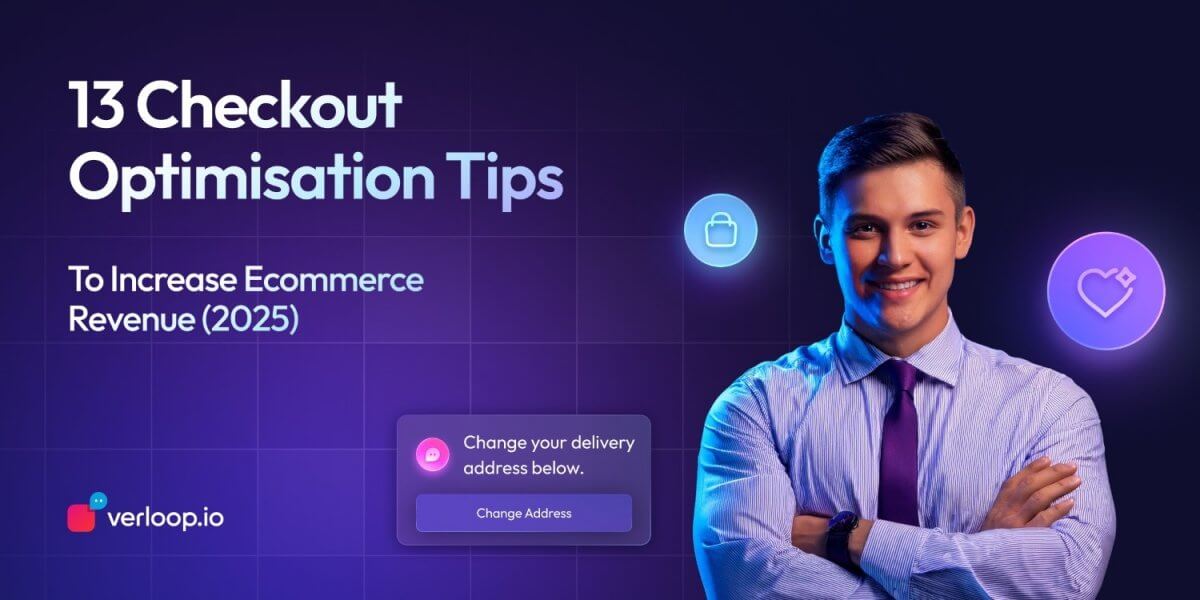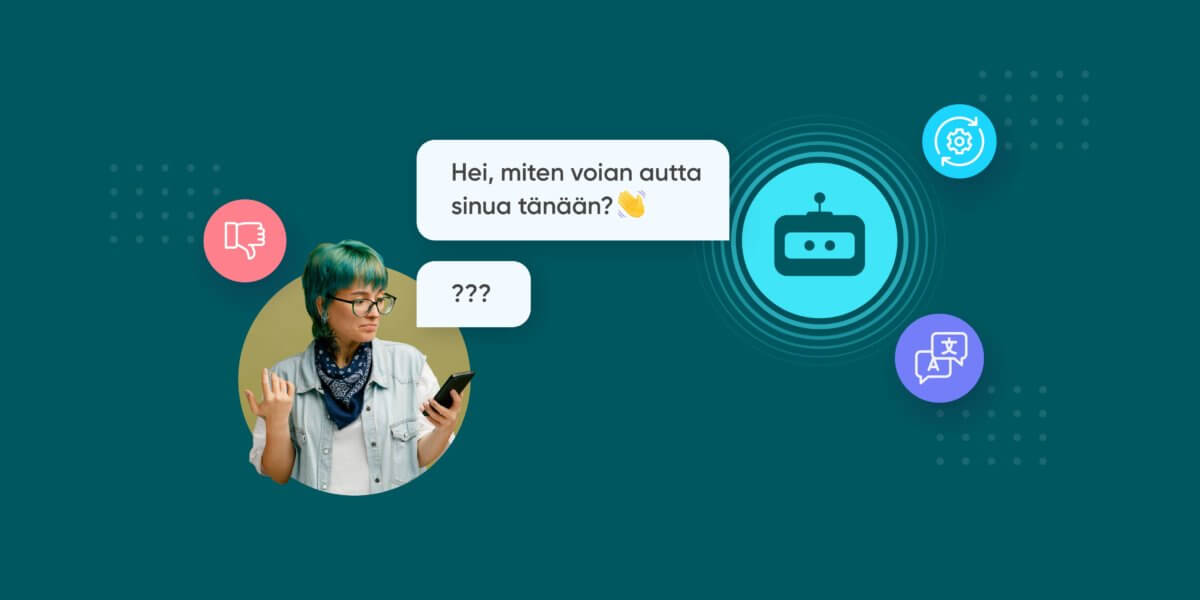6 Top Kore.ai AI Agent Alternative
- August 21st, 2025 / 5 Mins read
-
 Aarti Nair
Aarti Nair

6 Top Kore.ai AI Agent Alternative
- August 21st, 2025 / 5 Mins read
-
 Aarti Nair
Aarti Nair
Best Kore.ai Alternatives
Kore.ai’s Voice AI solution gives businesses the ability to build conversational experiences with its Voice Call Properties. These include features like call prompts, retry handling, grammar configuration, and node-level controls that allow you to set up how the AI responds during a voice interaction. For many businesses, this helps in creating structured and reliable customer conversations.
However, when it comes to deeper speech customisation, Kore.ai shows its limits. It doesn’t offer speech profiles, fine-tuned voice tones, or pronunciation controls — all of which are essential if you want your AI voice to sound natural, brand-aligned, and capable of handling industry-specific terms.
That’s where other platforms step in. For example, Verloop.io goes beyond basic voice call properties by offering speech profiles and advanced voice customisation tools, ensuring businesses can create experiences that sound both intelligent and human.
In this blog, we’ll explore the top 10 alternatives to Kore.ai for Voice AI — platforms that deliver more flexibility, richer voice features, and seamless human-AI collaboration.
Why Look for Kore.ai Alternatives?
Kore.ai is widely recognised as a strong AI agent platform. Users often highlight its API integrations, logical scripting with JavaScript, and low-code/no-code environment that make building and deploying agents both flexible and efficient. Many also appreciate the platform’s all-in-one design — from testing to plugging in LLMs and connecting to external data sources with RAG, Kore.ai reduces the need for multiple tools. Its ability to handle enterprise-scale use cases such as customer support automation, IT service desks, and booking systems makes it versatile and powerful.
However, even with these strengths, users have pointed out areas where Kore.ai falls short — creating demand for alternatives:
Response Latency with LLMs: While Kore.ai supports generative AI, users have noted delays in large workflows, which can affect the real-time experience.
Complexity for Beginners: Its wide feature set comes with a steep learning curve. Smaller teams may find it overwhelming compared to lighter AI agent platforms.
Enterprise Pricing: Kore.ai is better suited to larger enterprises. For smaller organisations, the cost can be a challenge.
Limited Version Control and Documentation: Developers have flagged gaps in versioning options and supporting resources.
Lack of Voice AI Agent Customisation: Kore.ai does not offer advanced features like speech profiles, pronunciation control, or adjustable voice tone — areas where alternatives such as Verloop.io provide stronger capabilities.
In short, Kore.ai is a robust AI agent platform with enterprise-level capabilities, but challenges around latency, complexity, pricing, and voice AI agent customisation mean it isn’t always the right fit. This is why businesses are actively exploring the top alternatives to Kore.ai that can better address these gaps.
Key Factors to Consider When Choosing an AI Agent Voice Platform
Choosing the right Voice AI Agent platform is about more than ticking boxes on a feature list. The real difference lies in how these features impact day-to-day customer interactions. Let’s break down the key factors — with scenarios to show why they matter.
1. Speech Customisation
Your Voice AI Agent shouldn’t sound like a generic robot. Imagine a healthcare hotline where patients call in for updates. If the AI mispronounces drug names or medical terms, it can lead to confusion and mistrust. Platforms with speech profiles, tone adjustments, and pronunciation controls make sure the AI speaks clearly, naturally, and in a way that matches your brand voice — whether that’s professional, empathetic, or casual.
2. Latency and Real-Time Performance
Picture calling your bank and asking for your balance, but the AI takes 5–7 seconds to respond. That delay feels frustrating, especially when customers expect real-time answers. A strong Voice AI Agent should deliver near-instant responses to keep conversations flowing smoothly, even during peak call hours.
3. Seamless Agent Handoff
AI can solve most issues, but not all. Suppose a customer is disputing a credit card charge. The Voice AI Agent can handle initial verification, but when the case gets complex, it should seamlessly transfer the call to a human agent — along with context. Without this, customers end up repeating themselves, which is a leading cause of poor CSAT scores.
4. Integration Capabilities
Think of an airline’s customer support. A traveller asks the Voice AI Agent to reschedule a flight. If the system integrates with the airline’s booking and payment APIs, the AI can complete the task instantly. Without strong integration, the AI might just say, “Please contact customer service”, which defeats the purpose of automation.
5. Scalability and Reliability
During festive shopping seasons, e-commerce platforms see call volumes spike dramatically. A scalable Voice AI Agent can handle thousands of simultaneous calls without crashing or lagging. Platforms without proven scalability risk downtime or poor response quality just when customers need them most.
6. LLM and Intelligence Features
Not every question fits a script. For example, in insurance, a customer might ask: “Does my policy cover dental surgery abroad?” A rule-based bot may struggle, but an LLM-powered Voice AI Agent with RAG can retrieve the relevant clause from policy documents and provide an accurate answer. This turns AI from a scripted tool into a smart assistant.
7. Analytics and Insights
Imagine a call centre manager wanting to know why CSAT scores dipped last month. A strong platform will provide detailed analytics on average handling time, call drop-offs, and customer sentiment. With this data, managers can pinpoint issues — say, long wait times or poor escalation handling — and fix them.
8. Cost and Flexibility
Consider a mid-sized retail brand. Kore.ai might be too enterprise-priced for them, making it hard to justify ROI. Alternatives like Verloop.io offer flexible pricing models, so businesses pay for what they need now, while still being able to scale later. This flexibility is crucial for companies that want enterprise-grade features without enterprise-level costs upfront.
With these factors in mind, the next step is to explore the top alternatives to Kore.ai that excel in delivering powerful Voice AI Agent experiences.
10 Top AI Agent Voice Alternatives
The rise of AI Agents has moved beyond hype and into measurable business impact. Companies no longer see AI as an optional add-on, but as a critical part of how support, sales, and operations are delivered. And nowhere is this more visible than in the evolution of Voice AI Agents — where automation and human-like intelligence combine to reduce costs, improve speed, and enhance customer satisfaction.
A recent PwC survey highlights this shift. Out of 300 senior executives surveyed in May 2025:
88% said their teams or business functions plan to increase AI-related budgets in the next 12 months, driven by agentic AI.
79% confirmed that AI agents are already being adopted in their companies.
And most importantly, 66% of those adopting AI agents report measurable value — particularly in increased productivity.
These numbers make one thing clear: the adoption of AI Agents is no longer “if” but “how fast.” Kore.ai is a known name in this space, but it’s not the only option. Businesses looking for advanced Voice AI Agent capabilities, faster performance, or more flexible pricing models have several strong alternatives to consider.
In this section, we’ll walk through the 10 top alternatives to Kore.ai, each offering unique strengths to help businesses meet their customer engagement and automation goals.
1. Verloop.io
Verloop.io is an AI Agent platform built to help businesses automate customer interactions across chat and voice. Its standout feature is the Voice AI Agent, designed for real-time, natural conversations that merge LLM intelligence with low-latency performance. Unlike Kore.ai, Verloop.io focuses on making AI voice experiences brand-consistent with advanced speech customisation features.
Key Strengths
Speech Profiles: Define tone, pitch, and delivery style so the AI speaks in a way that matches your brand voice.
Pronunciation Control: (Upcoming) Allows fine-tuning of how industry-specific terms, product names, or customer names are pronounced.
Low Latency: Optimised for real-time interactions, ensuring customers don’t feel delays during conversations.
Seamless Agent Handoff: Voice AI Agents hand over to human agents smoothly, passing full context without customers needing to repeat themselves.
Analytics & Quality Audits: Built-in tools like Sparks automate audits, provide insights into performance, and offer tailored feedback for support teams.
Omnichannel Support: Unified view across chat, WhatsApp, and voice channels, making it easy for businesses to manage interactions in one dashboard.
Limitations
Geared more toward mid-market and enterprise use cases; very small teams may find the platform feature-rich beyond their immediate needs.
Heavy focus on customer support and sales — not as general-purpose as some larger enterprise AI platforms.
Best For
Companies looking for a Voice AI Agent platform with advanced customisation, real-time performance, and strong agent handoff. Particularly well-suited for retail, e-commerce, travel, healthcare, and BFSI sectors where speed, accuracy, and customer experience are critical.
2. Intercom (Fin AI Agent)
Intercom’s Fin AI Agent is positioned as the #1 AI Agent for customer service. Powered by the proprietary Fin AI Engine™, it is specifically engineered to understand context, interpret intent, and deliver high-quality answers from a company’s knowledge base. Fin not only resolves 50–65% of customer queries on its own but also hands off to human agents when needed. What sets it apart is Intercom’s unified workspace, where teams can analyse, train, test, and deploy Fin seamlessly.
Key Strengths
Fin AI Engine™: Purpose-built for customer service, ensuring precision, reliability, and speed.
High Deflection Rate: Resolves around 50–65% of support queries without human involvement, reducing workload and costs.
Comprehensive Workspace: Analyse performance with actionable insights, train tone and actions, test before going live, and deploy across multiple channels — all in one no-code environment.
Global Capabilities: Translation and categorisation tools help maintain consistency across languages and improve organisation of knowledge bases.
Integration-Friendly: Works with major helpdesks such as Zendesk, Salesforce, HubSpot, or as part of the full Intercom Customer Service Suite.
Human + AI Synergy: Fin handles most queries while agents focus on complex issues, supported by Intercom Copilot for added efficiency.
Limitations
Pricing Model: At ~$0.99 per resolution, costs can escalate quickly, especially for high-volume businesses. Even incomplete chats may add to the bill, making budgeting unpredictable.
Handoff Delays: Some users report lag when Fin transfers to a human agent, causing customer frustration if the AI resumes mid-conversation.
Complex Queries: While strong overall, Fin can occasionally provide generic answers or miss nuance in very niche situations.
Analytics Depth: Users note that deeper customisation and richer analytics would improve its value further.
Best For:
Businesses that want an AI Agent platform tightly integrated into their support stack, with a focus on chat-based automation and high self-service rates. Fin is particularly valuable for companies with large support volumes that want to deflect routine queries, but organisations should weigh its variable pricing model carefully.
3. Bland AI
Bland AI is an API-first Voice AI Agent platform designed primarily for technical teams. It offers granular control over how calls are handled, with webhook-based workflows, programmable logic, and compatibility with telephony providers like Twilio and Vonage. For developers building a custom voice stack from the ground up, Bland provides flexibility and control.
However, as teams move from experiments to enterprise-scale deployments, Bland can feel limited. Its lack of no-code tools, basic reporting, and English-only support makes it less accessible for non-technical stakeholders or global businesses.
Key Strengths
API-First Architecture: Maximum flexibility for engineering teams building custom voice stacks.
Compliance: SOC 2 and HIPAA certified, making it suitable for healthcare use cases.
Telephony Options: Integrates with Twilio, Vonage, and BYOC (bring your own carrier).
Voice Cloning (Beta): Early-stage custom voice testing for more personalised agents.
Developer Features: Real-time audio injection, GPT-compatible prompts, and webhook routing.
Limitations
Developer-Heavy Setup: No true no-code builder; non-technical teams struggle to participate.
Latency: Average ~800ms, leading to awkward pauses in live conversations.
English-Only Support: Additional languages require custom enterprise deals.
Limited Analytics: Basic reporting through APIs only; lacks visual dashboards.
High Costs for Scale: $0.09/min outbound and $0.04/min inbound, plus add-ons for transcription, LLM processing, and cloning. Annual budgets often start at $150K+.
Missing Enterprise Features: No ISO 27001, RBAC, audit logs, or on-prem hosting.
Best For:
Bland AI is best suited for developer-first teams with strong in-house engineering resources who want to code their Voice AI Agents from scratch. It’s a fit for proof-of-concepts, internal tools, or early experiments, but less ideal for customer-facing deployments at scale.
4. Synthflow
Synthflow positions itself as a no-code Voice AI Agent platform designed to help businesses automate inbound and outbound conversations. With features for appointment scheduling, lead qualification, and customer support, Synthflow promises to deliver smooth, natural-sounding voice interactions and easy integrations with popular CRM and automation tools.
The platform appeals to small and medium enterprises (SMEs), agencies, and enterprises looking to deploy 24/7 Voice AI Agents quickly. However, customer feedback reveals a very mixed picture: while some praise its integrations and automation capabilities, others describe frustrating support experiences, confusing pricing, and limitations hidden behind higher-tier plans.
Key Strengths
Voice AI Agent Automation: Handles customer calls for lead capture, FAQs, and scheduling, reducing missed opportunities.
Low Latency: Users highlight smooth voice quality and faster-than-average call response times.
Wide Integrations: Prebuilt connectors for Salesforce, HubSpot, SQL databases, BigQuery, S3, and more.
Flexible Setup: Offers both drag-and-drop configuration and code-friendly workflows (YAML/JSON).
Scales for SMEs: Affordable starter plan ($29/month) makes it accessible for early-stage teams.
Limitations
Pricing Frustrations: Advanced features often locked behind expensive enterprise tiers, leading some customers to describe it as a “bait-and-switch.”
Feature Gaps: No gendered or accent filters for voices, and limited trial experience.
Support Delays: Multiple reviewers cite 24+ hour delays, unresolved tickets, and lack of proactive communication.
Learning Curve: Early onboarding can feel complex, especially around workflows and integrations.
Trust Concerns: Complaints of billing issues and lack of phone support raise red flags for some businesses.
Best For
Synthflow works best for SMEs and agencies that want a Voice AI Agent platform with strong integration capabilities and are willing to invest time in setup. It’s less suited for businesses that require enterprise-grade support responsiveness, predictable pricing, or advanced voice customisation out of the box.
5. JustCall
JustCall is an AI-powered business communication platform that brings voice, SMS, email, and WhatsApp together in one place. Trusted by over 6,000 businesses globally, it helps sales, support, and customer success teams stay connected across multiple channels while leveraging AI Voice Agents to automate inbound calls, qualify leads, and book appointments.
The platform goes beyond telephony by adding AI-driven insights, agent coaching, and workflow automation. For businesses that want a unified system for communication and customer engagement — without juggling multiple tools — JustCall offers an integrated, scalable solution.
Key Strengths
Omnichannel Communication: Manage calls, texts, WhatsApp, and email from a single platform.
AI Voice Agents: Handle inbound calls 24/7, reducing missed opportunities while offering human-like precision in qualifying leads or booking meetings.
Agent Assist & Coaching: Real-time assistance, AI call scoring, and sentiment analysis to improve performance.
Global Reach: Business phone numbers in 70+ countries, making it easier to establish a local presence.
Integrations: 100+ CRM and workflow integrations, including Salesforce, HubSpot, and Pipedrive.
Productivity Boost: Customers report up to 40% reduction in call handling time with AI insights and automation.
Accessible Pricing: Starts at $29/user/month, making it competitive for SMEs.
Limitations
Onboarding Challenges: Setup and document verification can be lengthy and confusing, especially for first-time users.
Multi-Device Notifications: Calls can ring on multiple devices simultaneously, creating disruptions.
Integration Frictions: Some users report inconsistencies when syncing with Salesforce and other APIs.
Support Limitations: No direct phone support; most help is routed through chat or scheduled Zoom calls.
Number Porting Delays: Bringing existing numbers onto the platform can take longer than expected.
Best For
JustCall is ideal for SMEs, startups, and international teams looking for a cost-effective way to unify communications across channels while adding AI-powered automation. It works especially well for sales and customer success teams that depend on outbound calls, follow-ups, and consistent global communication.
6. Yellow.ai
Yellow.ai is an AI Agent platform that combines Voice AI Agents and Chat AI Agents to deliver omnichannel customer experiences. Its flagship feature is the Dynamic AI Agent (DAI), powered by large language models (LLMs), designed to handle real-time conversations across 35+ channels. Yellow.ai focuses heavily on enterprise-grade deployments, offering automation for support, sales, and HR use cases.
For businesses looking for a Kore.ai alternative, Yellow.ai provides advanced voice automation with low-latency response, multilingual capabilities, and prebuilt industry solutions that reduce time-to-value.
Key Strengths
Voice AI Agents: Handle inbound and outbound calls in multiple languages with natural-sounding voices.
Multilingual Support: Supports 135+ languages and dialects, making it strong for global enterprises.
LLM-Powered Intelligence: Contextual memory and retrieval-augmented generation (RAG) enable complex query handling.
Enterprise Integrations: Native connectors for Salesforce, Zendesk, SAP, and other major platforms.
Analytics & Reporting: Advanced dashboards track CSAT, call resolution, and customer sentiment.
Industry Solutions: Prebuilt templates for BFSI, e-commerce, healthcare, and telecom accelerate deployment.
Limitations
Enterprise Pricing: Best suited for mid-to-large enterprises; cost can be high for startups or SMEs.
Complex Setup: While powerful, configuration requires skilled teams and careful planning.
Support Scalability: Some users report delays in support during high-volume implementations.
Learning Curve: With so many capabilities, Yellow.ai can feel overwhelming for non-technical users.
Best For
Yellow.ai is ideal for large enterprises and global businesses that need scalable Voice AI Agents and omnichannel automation with strong multilingual support. It’s especially effective for telecom, BFSI, and retail/e-commerce industries where customer interactions span geographies and languages.
Choosing the Right AI Agent Voice Platform for Your Business
Kore.ai has proven itself as a capable AI agent platform, but as we’ve explored, it isn’t always the best fit for every organisation. Limitations in voice customisation, usability, and pricing flexibility push many businesses to look at alternatives that better match their needs.
From Verloop.io’s Voice AI Agents with advanced speech profiles, to Intercom Fin’s high-resolution chat automation, and platforms like Yellow.ai, JustCall, Amelia, and Five9 — each alternative brings unique strengths to the table. Some are best suited for SMEs needing cost-effective agility, while others are built for enterprises seeking multilingual voice automation at scale.
The key is to focus on what matters most to your business:
Do you need real-time voice performance with seamless agent handoff?
Are you looking for scalability and enterprise integrations?
Or do you value ease of use and fast deployment for your team?
By aligning platform capabilities with your goals, you’ll find the AI agent solution that not only fills Kore.ai’s gaps but also helps you deliver faster, smarter, and more human customer experiences.
FAQs
1. What is an AI Agent platform?
An AI Agent platform enables businesses to automate customer interactions using intelligent agents powered by LLMs (Large Language Models). These agents can handle queries, perform tasks, and, in the case of Voice AI Agents, manage phone conversations in real time.
2. Why should I look for Kore.ai alternatives?
While Kore.ai is powerful, it has limitations such as latency in LLM responses, complexity for beginners, and limited voice customisation features (e.g., no speech profiles or pronunciation control). Alternatives may offer better performance, flexibility, and pricing for your specific use case.
3. What industries benefit most from Voice AI Agents?
Voice AI Agents are widely adopted in industries like e-commerce, BFSI, travel, healthcare, telecom, and real estate — where real-time, human-like conversations improve customer satisfaction, boost sales, and reduce operational costs.
4. How do Voice AI Agents differ from traditional IVR systems?
Traditional IVRs follow rigid, menu-based flows. Voice AI Agents, on the other hand, understand natural language, respond in real time, and can seamlessly hand off to human agents when needed — creating a more conversational and efficient customer experience.
5. Are AI Agent platforms suitable for small businesses?
Yes. Platforms like Verloop.io, JustCall, and Synthflow offer flexible pricing and easy deployment for SMEs. However, enterprise-focused platforms such as Kore.ai and Yellow.ai may be better suited to larger organisations with complex automation needs.
6. How do I choose the right AI Agent platform for my business?
Consider factors such as:
Speech customisation (does it offer speech profiles and tone control?)
Latency (are responses instant and natural?)
Scalability (can it handle spikes in call volume?)
Integrations (does it connect to your CRM or helpdesk?)
Pricing flexibility (does it align with your budget and growth stage?)
7. Can AI Agents fully replace human support teams?
No — and they shouldn’t. AI Agents are best at handling routine queries, providing instant information, and reducing wait times. Human agents step in for complex, sensitive, or escalated issues, ensuring customers receive empathy and nuanced judgment where it matters most.








